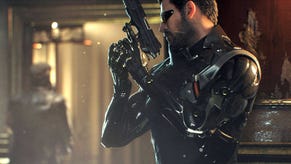Visible War: Hands-on with Deus Ex: HR's first two hours
After 11 long years and one less-than-stellar sequel, Deus Ex is finally back in the gold-hued spotlight. We play the opening sections and grill director Jean-François Dugas.
The gaming industry's a fairly predictable beast. If your game does well and garners a mass of frothy-mouthed fans, odds are, it's going to get a sequel. And another. And another. Deus Ex, however – at the ripe old age of 11 – has only ventured into follow-up territory once. And to many fans, Invisible War may as well be, well, invisible.
And yet, it speaks to the reverence humans hold for the revolutionary franchise that, many years later, all eyes are on Human Revolution. That, however, is quite the double-edged sword. “The game has to be this way, the game has to be that way,” franchise zealots demand while scrutinizing every last detail. There's a thick wall of anticipation surrounding Human Revolution, sure, but go deeper and you'll find a heart made of solid, unrelenting expectation.
Obviously, Eidos Montreal is under a mountain of pressure, but will it get crushed or soar straight toward the sun, buoyed by powerful wax wings? We played the first two hours of the game and spoke with its creators, and we're happy to say that we're definitely leaning toward the latter.
Humble beginnings
Human Revolution certainly doesn't start like a traditional first-person shooter. No explosions. No thematically inappropriate wise-cracking soldiers. No Carmines getting shot in the head. Instead, the game kicks off by introducing you to an ideological conflict – that of augmentation and transhumanism versus purity and, arguably, humanity. Main character Adam Jensen follows his girlfriend – who's recently made a major breakthrough in the field – through the sterile white Sarif Industries augmentation lab, and it's there that the stage is set for the argument that will dominate the rest of the game. And who will win? Well, that's for you to decide.
“Your character is augmented,” director Jean-François Dugas told VG247. “You know, he needs to upgrade and that sort of thing. So, for us, at the base of the game transhumanism is a very powerful thing in the gameplay. We really wanted to make a game about where we're headed as humans, where technology's going. And we wanted to explore it from a neutral position in that we're not saying it's good to go all the way or 'oh no, we shouldn't do that.'”
"We really wanted to make a game about where we're headed as humans, where technology's going."
“But we reflect in the game that people are like 'we shouldn't stop ourselves at physical limitations' and other people are more like 'maybe we're trying to play god here, and it might not be a good idea' type of thing. It's almost like a pro-life and pro-choice type of thing. We really wanted to make it two different sides of the same coin and just give equal thoughts to the players. To us, you might play this game with guns and shoot and have fun. And you end up there, and you have a good time. Then you go somewhere else that's fun. But if you want to dig more, we have a lot of things you can read in the game that make you think about [transhumanism and similar subjects].”
It's not long, then, before things go south for the stoic, augmentation-opposed Jensen. The lab's breached, and Jensen – being a security officer – is forced to investigate. And it's all downhill from there. After a brief tutorial – which introduced us to the game's solid shooting and slick cover system – Jensen encountered a group of heavily augmented thugs attacking his girlfriend. Unfortunately, all the righteous fury in the world didn't save him from an augmented fist to the face, which sent him crashing through all manner of glass, other pointy objects, and even some fire, if we're remembering correctly. Barely alive, Jensen then got to witness one final sight: a gun aimed right between his eyes.
“We can rebuild him...”
What followed was one of the most interesting opening credit sequences we've seen in quite some time. Essentially, it stitched together scenes of Jensen on the operating table with hazy memories of time spent with his girlfriend. The contrast was all at once unsettling, intriguing, and surprisingly touching. When it was all said and done, we heard one last faint whisper: “I love you. I'm sorry.” Haunting.
It's a shame, however, that the ensuing character interactions were less convincing. If there's one complaint we can level against Human Revolution after our time with it, it's that characters were stiff – both in terms of animations and facial expressions – and dialog ranged from servicable to flat-out awkward. Just as the world - with its dim black-and-gold aesthetic and general air of mystery - drew us in, the subpar character interactions yanked us out. Even so, we were definitely intrigued by Jensen's plight, which – according to Jean-François – isn't merely a vehicle for the plot.
"Choice has been removed from Jensen. And he's going to fight hard to make sure that never happens again."
“It can be a little of both in the sense that it's a driving force – like, a choice has been removed from [Jensen]. And he's going to fight hard to make sure it's never removed from him again. But also, depending on how you play the game, you can learn more about your own character, his own story, his own past, and things like that. So there might be bigger things to understand as you play the game. But again, depending on how you play it, you might not get as deep in what I'm saying,” he explained.
Free will
Six months after literally being brought back from the grave, Jensen was already back on the job. Of course, it helped that he was sporting his trademark mechanical arms and, most importantly, his auto-sunglasses, which – on their own – pretty much justify the entirety of transhumanism, we think. Unfortunately, in Jensen's line of work there's no such thing as an easy day, so he immediately shipped off to defuse a hostage situation involving a group of pro-human-purists-turned-terrorists. Interestingly, however, we actually weren't entirely railroaded in that pre-mission situation. Jean-François explained:
“When you're in the offices before your first real mission, if you spend too much time there, the hostages in the other mission are going to die because it's a hostage situation! But we're not putting a counter [on the screen]. There's no timer. If you just decide to read all the emails in the office, well, of course the hostages are in trouble, right? So that's how we approach it.”
“So we always try to go with consequences that may not be immediate. They might be delayed or shortly after, but when you make your choice, you don't know necessarily what you're going to get. In the end, we'll see how players react to it, because it's likely different from what other games do.”
Really though, Human Revolution is all about choices both large and small, and some are more explicit than others. However, that doesn't make them any less impactful. For instance, at the start of the mission, we were able to select our weapon loadout: lethal or non-lethal. Being the saintly souls that we are (for example, VG247's servers devour only half the number of fuel kittens of our leading competitors!), we went non-lethal. That was a mistake.
A lot of dying
While it was most certainly frustrating at the time, we're happy to report that Deus Ex doesn't turn the path of least resistance into a pleasant afternoon skip down a diamond-crusted cakewalk. This isn't, say, BioShock, where being a goodie two-shoes offered roughly the same tangible rewards as selling your soul for power. So, the long and short of it? We paid for our well-intentioned pacifism. We died. A lot.
Fortunately, each area we came across provided us with a tremendous number of options, so if one method didn't work, we simply tried another. Is knocking out everyone in the room a tad too messy for your tastes? Find a vent and sneak around them. Or maybe dive from cover-to-cover until you can climb a ladder that'll put you out of their field of vision. Or activate your temporary cloaking aug, sneak behind some halfway point, and then wing it from there.
And that's only the tip of the iceberg. We also came across stackable boxes, hackable turrets, and other useful improv tools of the like. After a while, we even started manipulating guards to make our own life easier. For instance, did you know that sudden contagious on-the-job narcolepsy isn't normal? It's true! So we'd tranquilize a guard or two, wait for the others to break patrol to investigate, cloak, and then sprint right past them. If nothing else, that breadth of options is the true mark Deus Ex's legacy has left on Human Revolution, and that's why Dugas and co believe it will succeed.
“When you get in a game like Deus Ex, you have a bit of everything. You know, you can have a lot of combat, a lot of stealth. I think, from a player's perspective, it's something really, really powerful to be able to craft your experience the way you want. In that respect, it can be really appealing. And just because you like a really scripted shooter, it doesn't mean you can't like a game like that. Sometimes you want something simple, and sometimes you want something really deep and really immersive. I think there's a place in the market for it, and people will want to dig into it,” Dugas told us.
Augmented reality
All shooter trappings in the world can't hide what Human Revolution really is: an RPG. And unlike many developers – who mumble those three dreaded letters as though fearing they'll summon some form of dark wizard – Eidos Montreal isn't making any bones about it. Human Revolution is an action-RPG, sure, but an RPG nonetheless. As such, performing damn near any action yields some amount of XP. Whether you silently knock someone unconscious or give them your own special brand of augmentation in the form of a nice, gaping stomach hole, you slowly-but-surely accumulate currency to spend on Praxis Points. Each Praxis Point is more or less a level up, and you can spend it on an upgrade to your augmentations – of which there are 21, each with their own specific upgrades and modifications.
"It's something really, really powerful to be able to craft your experience the way you want."
It's a complex system to be sure, but the potential breadth of options and playstyles is undeniably enticing. With everything from the obvious (hacking, cloaking, strength, speed) to the passive (upgraded health, energy, and lung capacity) to the things that makes Superman feel inadequate (mind-reading, X-ray vision, the ability to fall and take little-to-no damage), it's almost overwhelming. But in a good way.
No bang, no whimper
After weaving a trail of our own bodies through the complex, we finally encountered the terrorist group's bossman, who clearly didn't expect things to escalate to this level. In a panic, he grabbed a nearby hostage – a woman who had the misfortune of showing up for work that day – and jabbed a gun against her temple. That, unfortunately, is when the glitches began. See, this was supposed to be a climactic battle of wits; we'd read the terrorist leader's vocal cues, facial expressions, and body language, and then – based on those factors – decide how to talk him out of scrambling this poor woman's gray matter. Bear in mind, however, that we were playing an early build of the game, so when the game's sound was abruptly replaced by total silence, we weren't entirely surprised.
What ensued, then, was almost comical. We watched as the man ranted and raved – his eyes growing wide and wild – but his rapidly flapping gums didn't emit a peep. Each time we were given the chance to respond, we just picked the “empathize” option, because honestly, dude looked like he was having a rough day. He probably just wanted a hug. And to our surprise, it worked. After a few scares, he tossed the woman aside and sprinted out a nearby door. The day was saved because... well, we don't really know what happened. So then we triumphantly strolled back to our helicopter, and the game crashed entirely. Whoops. Fortunately, that was where the demo was supposed to end anyway, but here's hoping Eidos Montreal irons out those fairly serious kinks before the game's August release.
That's not to say, however, that we didn't enjoy our time with Human Revolution. We did – quite a lot, actually. The spirit of the original Deus Ex is alive and well (thriving, even) here, and it was only after taking the new game for a test run that we realized how big of a void the series' absence left in our gaming lives. So, Deus Ex, it's good to have you back. It's been far, far too long.







